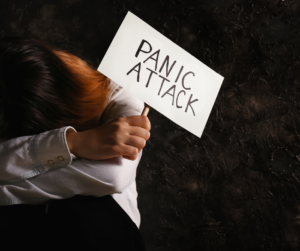Anxiety attacks, also known as panic attacks, can be overwhelming and debilitating experiences that affect millions of people worldwide. In this article, we’ll delve into the symptoms of anxiety attacks, explore common triggers, and discuss effective coping strategies to manage them.

What are Anxiety Attack Symptoms?
- Intense Fear or Panic: Anxiety attacks are characterized by sudden and intense feelings of fear or panic that can be overwhelming and difficult to control. Physical Symptoms: These may include rapid heartbeat, chest pain, sweating, trembling or shaking, shortness of breath, dizziness, and nausea.
- Cognitive Symptoms: Anxiety attacks often involve negative or catastrophic thinking patterns, such as fearing you’re having a heart attack or going crazy, feeling like you’re losing control, or experiencing derealization or depersonalization.
- Emotional Symptoms: Individuals may feel a sense of impending doom or dread, along with intense feelings of anxiety, helplessness, or terror.
- Behavioral Symptoms: Anxiety attacks can lead to avoidance behaviors, such as avoiding certain places or situations that trigger anxiety, as well as seeking reassurance from others or engaging in safety behaviors.
Common Triggers of Anxiety Attacks:
- Stress: High levels of stress, whether related to work, relationships, finances, or other life events, can trigger anxiety attacks.
- Trauma: Past traumatic experiences, such as abuse, accidents, or natural disasters, can contribute to the development of anxiety attacks.
- Phobias: Specific phobias, such as fear of flying, heights, or enclosed spaces, can trigger anxiety attacks when confronted with the object of fear.
- Major Life Changes: Significant life transitions, such as moving, starting a new job, getting married, or having a baby, can be stressful and trigger anxiety attacks.
- Substance Abuse: Alcohol, drugs, and certain medications can exacerbate anxiety symptoms and trigger panic attacks.
Effective Coping Strategies for Anxiety Attacks:
- Deep Breathing: Practice deep breathing exercises to help calm your body’s physiological response to anxiety and reduce symptoms of panic.
- Progressive Muscle Relaxation: Learn progressive muscle relaxation techniques to release tension and promote relaxation throughout your body.
- Mindfulness Meditation: Practice mindfulness meditation to cultivate awareness of your thoughts and feelings without judgment, helping you stay grounded during anxiety attacks.
- Hypnotherapy: Hypnosis can help individuals identify and reframe negative thought patterns that may be contributing to their anxiety. It can also help build confidence in the ability to manage anxiety, making it easier for individuals to manage stressful situations.
- Cognitive Behavioral Therapy (CBT): Work with a therapist trained in CBT to identify and challenge negative thought patterns that contribute to anxiety attacks, replacing them with more balanced and realistic thinking.
- Medication: In some cases, medication may be prescribed to manage symptoms of anxiety attacks, particularly if they occur frequently or interfere with daily functioning. These may include antidepressants, anti-anxiety medications, or beta-blockers.
Anxiety attacks can be frightening and distressing experiences, but with understanding and effective coping strategies, they can be managed and overcome. By recognizing the symptoms of anxiety attacks, identifying common triggers, and implementing proactive coping techniques, individuals can regain a sense of control and empowerment over their anxiety. Remember, seeking support from a mental health professional can provide invaluable guidance and support on your journey to managing anxiety attacks effectively.
Get a free copy of my program, The Power of Your Unconscious Mind,to better understand where anxiety comes from and how we can get rid of it.
